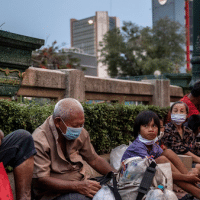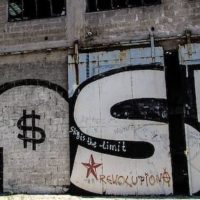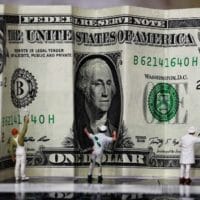-
Detainees during the Pandemic
It is a common practice all over the world that when those incarcerated face a threat to life, the authorities send them home.
-
Decline in global poverty is a farce perpetuated by World Bank’s poverty line
The real problem with the World Bank’s poverty estimates, is that its International Poverty Line is set at an impossibly low level, which greatly underestimates world poverty.
-
India’s abysmal healthcare system
DD Kosambi uses a telling example to illustrate the crisis of Indian feudalism: at the third Battle of Panipat in 1761, the troops on oneside had not had enough to eat, while the troops on the other side just managed to assuage hunger by looting villages in the neighbourhood; neither side in short had arranged provisions for its troops.
-
A stock market boom amidst a real economy crisis
Altogether, as philosopher Cornel West put it, the U.S. is showing every sign of being a “failed social experiment”. And yet there is a veritable boom in the U.S. stock market. The stock market index Nasdaq has increased by more than 40 per cent since March 23 and is now “within striking distance of all time highs” as one commentator put it.
-
Imperialism and India’s food economy
The problem before metropolitan capitalism therefore is: how to acquire control over the use of this tropical land-mass in order to obtain the products it needs?
-
The problem of external debt
There is a massive problem of external debt building up for the third world, of which the recent Argentine debt crisis was only one manifestation. At the root of the problem is the collapse of primary commodity prices in the world market which began in April 2011.
-
The World at crossroads
Radical reforms in reversing the prevailing policy direction of the last four decades will need to be put on the table. Governments will have to accept a more active role in the economy. They must see public services as investment rather than as liabilities and look for ways to make the labour market less insecure. Redistribution will again be on the agenda… Policies until recently considered eccentric such as basic income and wealth taxes will have to be in the mix.
-
The war on Labour
The war on labour is a continuation of the attacks which the BJP has been launching on the religious minorities and dalits; its economic consequences will be disastrous.
-
Finance’s preference for the Metropolis
The current globalization was always legitimized by the argument that capital today, unlike in colonial times, had become blind to racial and other such distinctions across countries in deciding upon its location; it would now flow wherever opportunities for profitable investment existed.
-
The exodus of finance from the third world
There is an exodus of finance from the third world at present, far exceeding in scale what had occurred in 2008 after the financial crisis.
-
Globalisation and the pandemic
SSER-IDEAS Online Lecture Series — COVID-19 Pandemic: Policy Failures and Their Impact on the Lives of People
-
Finance versus the people in the era of the pandemic
THE current pandemic has brought to the fore, and with exceptional clarity, the fundamental contradiction underlying contemporary globalisation, namely, the contradiction between the interests of finance and those of the people. Indeed this contradiction, which characterizes the era of globalisation as a whole, has now come to a head.
-
Pandemic and socialism
As COVID-19 grips the world, in country after country, there is socialization of healthcare and of production of some essential goods, which markedly departs from the capitalist norm
-
Some basic lessons from the pandemic
The coronavirus attack has so far been much less deadly than the Spanish flu of a century ago. That had affected 500 million people worldwide, about 27 per cent of the world’s population of the time, and had a death rate of about 10 per cent among those affected.
-
The uses of “populism”
CLASS struggle occurs in the realm of concepts too. The World Bank for instance systematically counters Left concepts by employing a novel tactic: it uses the very same concepts as are used by the Left, but gives them a wholly different meaning; as a result they either come to mean something entirely different from what the Left had originally meant by them, or, at the very least, they become fuzzy and hence useless to the Left. In either case the power of the Left concept is neutralised.
-
Capitalism, socialism and over-production crises
Unlike capitalism, socialism avoids any waste or slack, such as is caused by an over-production crisis, by raising the consumption of workers appropriately to avert it.
-
The perversity of the neo-liberal fiscal regime
When income growth slows down in an economy, so does the growth of tax revenue within the given tax regime. Since the government has certain expenditure obligations, to meet these obligations it has to either impose additional taxes or expand its fiscal deficit.
-
Some comments about Marx’s epistemology
Marx’s eleventh thesis on Feurbach: “the philosophers have hitherto only interpreted the world in various ways, the point is to change it”, has been often taken to mean that interpreting the world and changing the world are two separate and disconnected activities.
-
The systemic crisis of world capitalism
THE hallmark of a systemic, as distinct from a cyclical or sporadic, crisis of capitalism is that every effort to resolve the crisis within the broad confines of the system, defined in terms of its prevailing class configuration, only worsens the crisis.
-
The debate over inequality
The debate over inequality has become hotter world-wide. While Trump had introduced substantial tax cuts for the rich in 2017, and Britain’s Boris Johnson, the front-runner to succeed Teresa May, has promised to do the same if he becomes Prime Minister, there are strong proposals for taxing the rich which have also been mooted. Bernie Sanders had such a proposal for the U.S. during the time that he was seeking the Presidential nomination of the Democratic Party.




















